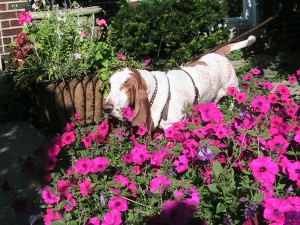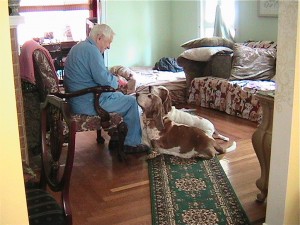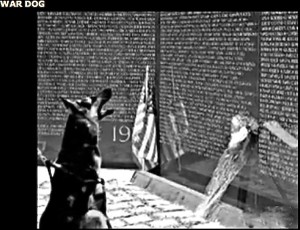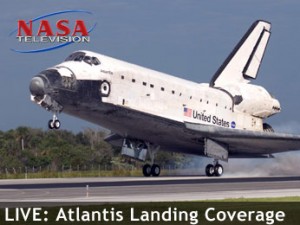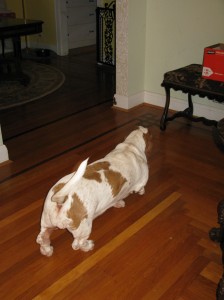Howllo Fellow Basset Hound and War Dog lovers: I hope everyone is enjoying a nice Memorial Day. Here in Basset Hound Town we are taking a few blog postings to honor War Dogs, all of whom were and are heroes.
Their training is intense; their working conditions are deplorable; their lives are always on the line. The most innocent and vulnerable of combat veterans-our Nation’s War Dogs.
Rare photo from WW2
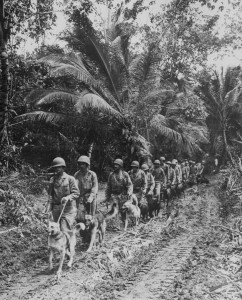
They fight and protect our brave enlisted personnel.
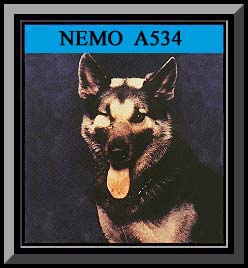
” Nemo ” Remembered
Nemo
No. A534, 377th Security Police K-9
Tan Son Nhut Air Base, Vietnam. 1966
Airman 2nd.Class Bob Thorneburg and his K-9 Nemo were assign duty near an old Vietnemese graveyard about a quarter mile from the air base’s runways. No sooner had they started their patrol… Nemo alerted on something in the cemetery. But before Thorneburg could radio the CSC, that “something” opened fire.
Thorneburg released his dog and then charged firing into the enemy. Nemo was shot and wounded, the bullet entering under his right eye and exited through his mouth. Thorneburg killed one VC before he too was shot in the shoulder and knocked to the ground.
That might of been the sad end of the story. But Nemo refused to give in without a fight. Ignoring his serious head wound, the 85 pound dog threw himself at the Vietcong guerrillas who had opened fire. Nemo’s ferocious attack brought Thorneburg the time he needed to call in backup forces.
A Quick Reaction Team arrived and swept the area but found no other Viet Cong. However, security forces, using additional sentry dog teams, located and killed four more Viet Cong. A second sweep with the dog teams resulted in discover of four more Viet Cong who were hiding underground. They, too, were killed.
Although severely wounded, Nemo crawled to his master and covered him with his body. Even after help arrived Nemo would not allow anyone to touch Thorneburg. Finally separated, both were taken back to the base for medical attention. Thorneburg was wounded a second time on the return to the base.
Lt. Raymond T. Hutson, the base vet, worked diligently to save Nemo’s life. It required many skin grafts to restore the animal’s appearance. Nemo was blinded in one eye, After the veterinarian felt Nemo was well enough, the dog was put back on perimeter duty. But it turned out his wounds needed further treatment.
On June 23, 1967, Air Force Headquarters directed that Nemo be returned to the United States with honors, as the first sentry dog to be officially retired from active service.
Thorneburg had to be evacuated to the hospital at Tachikawa Air Base in Japan to recuperate. The handler and the dog who saved his life said their final goodbyes. Airman Thorneburg fully recovered from his wounds and also returned home with honors.
Nemo flew halfway around the world accompanied by returning airman Melvin W. Bryant. The plane touched down in Japan, Hawaii and California. At each stop, Air Force vets would examined the brave dog for signs of discomfort, stress and fatigue…after all he was a War Hero!
Finally, the C-124 Globemaster touched down at Kelly Air Force Base, Texas, on July 22, 1967. Captain Robert M. Sullivan, was the officer in charge of the sentry dog training program at Lackland, and was the head of Nemo’s welome home committee.
“I have to keep from getting involved with individual dogs in this program,” Sullivan said, “but I can’t help feeling a little emotional about this dog. He shows how valuable a dog is to his handler in staying alive.”
After settling in Nemo and Captain Sullivan made a number of cross country tours and television appearances, as part of the Air Force’s recruitment drive for more war dog candiates, until the US involvement in Vietnam started to wind down.
Nemo spent his retirement at the Department of Defense Dog Center, Lackland AFB, Texas. He was given a permanent kennel near the veterinary facility. A sign with his name, serial number, and details of his heroic exploit designated his freshly painted home.
Nemo died December 1972 at Lackland AFB, shortly before the Christmas holiday: after an failed attempt to preserve
his remains, the Vietnam War hero was layed to rest on March 15, 1973, at the DoD Dog Center, at the age of 11. Until then, his presence at Lackland reminded students just how important a dog is to his handler – and to the entire unit.
Hahn’s 50th AP K-9, West Germany
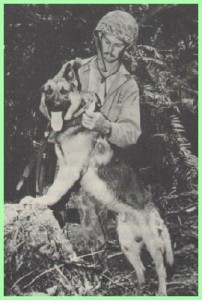
Caesar, a messenger dog, with his handler during World War II.
Wounded during a Japanese attack, Caesar carries the scar
of a bullet wound to his left shoulder.
(War Dogs-A History of Loyalty and Heroism; National Archives)
I hope to have a few more tributes through out the day.
More remembering the fallen later…..Love, Cat, Chaps and Emma
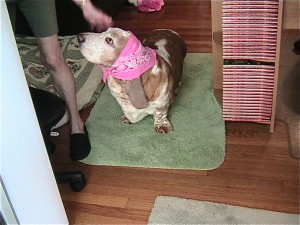
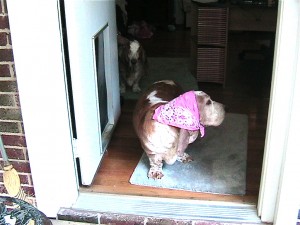

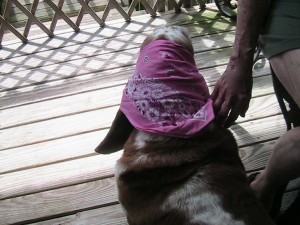
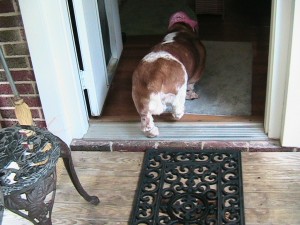
 Comments(12)
Comments(12)
